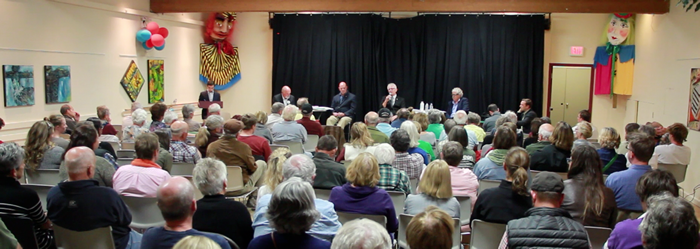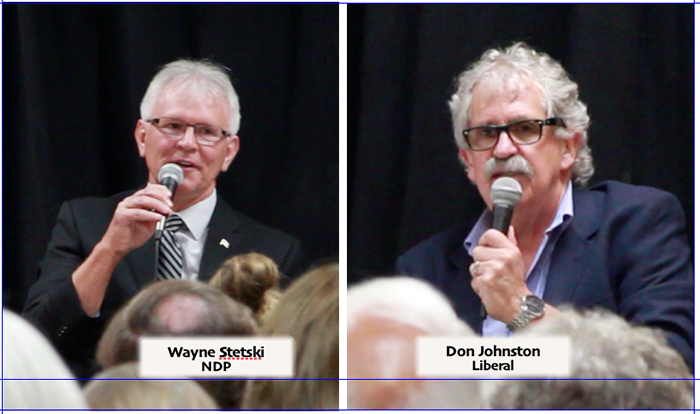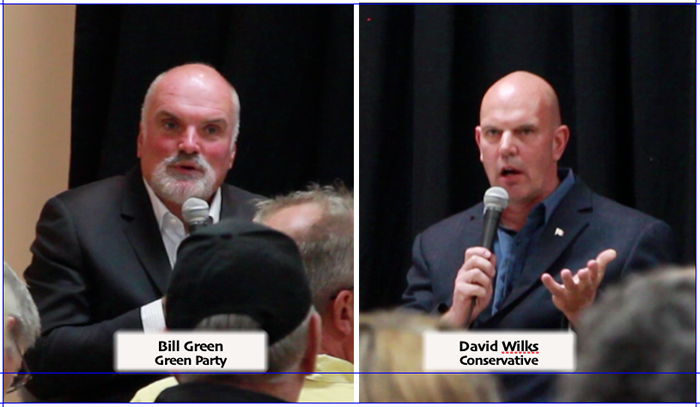The Place In Which We Live:
Columbia Commonwealth
Nature, fish, people and other parts of the environment were among the items ignored when the Columbia River Treaty between Canada and the United States was signed in 1964. Power generation and flood control were what mattered.
Things have changed. Eileen Delehanty Pearkes has studied and written about the complex ecosystem which is the Columbia River Basin. She has also curated an exhibition on the Columbia River Treaty and its impact on the people and other parts of the environment in the two signatory nations: Canada and the U.S.
Eileen graciously sent us a copy of Treaty Talks: A Journey Up the Columbia River For People and Salmon. It is an excellent way to see and better understand the challenge of the Columbia Commonwealth. We thank Adam Wicks-Arhack for making it available to us.
• • •
On Sunday, 20 September, there was a ribbon-cutting for the new gazebo at the Kimberley Open Gate Garden. Apples were juiced and zucchini raced and another community resource was dedicated.
• • •
Some years ago, (Sir) Harry Evans quoted for us Lord Northcliffe's incisive comment:
“News is something someone wants to suppress.
Everything else is advertising.”
Evans repeated that quote at a reception in his honor at the British Embassy in Washington, DC, celebrating the publication of his memoir My Paper Chase in 2009. Harry Evan is simply one of the best reporter/editors we have ever met. If, as do we, you think that authentic, quality journalism is important, read his book. You might also enjoy watching Sir Harry's performance at the reception. It is very informative.
|
|
Our Neighbors
Kim McLean — Bavarian Home Hardware
Stan Cuthill — Kimberley Building Supplies
Tara Penner — Pivot Data
Grady Pasiechnyk — Wine Works
|
All-Candidates Forum:
30 September, Kimberley, BC
Who Will Represent Us?

The new federal Kootenay-Columbia riding will be represented by one of the four men I saw at the recent All-Candidates Forum. The highlight of the evening delighted me and might surprise you. It was the questions that came from obviously concerned citizens. They were excellent. Thoughtful. Probing. Promising. Wide, deep and knowledgable.
Public policy at the national (and provincial) level has radically changed the Canada I once knew into a place the world barely recognizes. So I was indeed grateful to hear hard questions being posed. There were no major surprises, though it was helpful to hear the perspectives of the national parties applied to our local circumstances.
I guess I just didn’t realize that the title “Forum” was meant in the classical (Roman) sense: a gathering place. Admittedly, I prefer meaningful exchanges between serious people seeking heavy responsibilities ... democratic dialog as Cornel West characterizes it. There was no direct interaction between and among the candidates, so off-the-cuff responses under direct pressure were not part of the process. Of course, this format minimizes the likelihood of the event degenerating into a barroom brawl or an escalating crescendo of “did so”, “did Not”, “Did So”, “Did NOT”, “DID SO, DID NOT” ... . Sometimes a brawl can be informative, and, I understand why the organizers (thank you Kimberley Chamber of Commerce) chose the more restrained approach.
While that format could have put the kibosh on any genuine interaction, the audience responded gladly to a couple funny little asides that did slip in. After all, the ways a candidate presents all-by-himself truly does deliver real insights into a candidate’s character, if not his core values and emotions.
The people who came to Centre 64 also had the opportunity before and after the headline event to have private discussions with the candidates, some of which might become very important.
So I didn’t get the democratic dialogue I’d anticipated. But I did get a better sense of the regions’ citizens whom one of these four will represent to one degree or another -- voters eager to discern genuine differences among and between each candidate and his party before voting in this inestimably crucial 2015 federal election.
The world will be tuned in the night of October 19 to see what, in addition to politeness and hockey, Canadians value.
— PJG, editor

David Wilks, representing the incumbent Progressive Conservatives, had the thankless task of having to defend that party’s abysmal record on the economy, on the environment, on First Nations, on security, on ethics, on evidence-based decision-making, on education, on ... and on. At one point he was reduced to simply reading statements (on access by the citizenry to information about what the government is actually doing) from the PMO. How much of what he said reflected genuinely held beliefs and how much rote defense of the party was hard to judge.
But Mr. Wilks was an outlier in the discussion. The three other candidates appear to represent authentically progressive views (not just by comparison to those of the Progressive Conservatives).
Bill Green (Green Party), Don Johnston (Liberal Party) and Wayne Stetski (NDP) differ in their approaches but each seems more closely attuned to the interests of the new Kootenay-Columbia riding. Voters get to decide on the 19th. Will they vote their parochial interests, what they view as the interests of the province or of the nation, strategically ... or tactically? It really does matter. As Churchill reportedly said: "Democracy is the worst form of government, except for all the others."
Stay tuned.
— BR, editor

|
Elected Representatives
Mayor Don McCormick
Our October conversation focuses principally on the Mayor's participation in the Union of BC Municipalities (UBCM) conference in Vancouver. Kimberley won the "Leadership and Innovation Award", stirred up interest in how RMI (Resort Municipality Initiative) funding is allocated and argued, perhaps persuasively, that "risk" cannot be reduced to zero.
The earlier editions of conversations with the Mayor are here.
SunMine
The largest solar installation in western Canada officially signed onto the grid on 27 July, 2015. Built on a reclaimed brownfield site of what was once the world’s richest lead and zinc mines, the aptly name SunMine moves Kimberley, BC decisively toward a sustainable future.
The SunMine is Now Open for Business
27 July, 2015
Congratulations Kimberley!
°°°°°°°°°°°°°°°°°°°°°°°°°°°°°°°°°°°°°°°°°°°°°°°°°°°°°°°°°°°°°°°°°°°°°°°°°°°°°°°°
Broadband is Not Enough, But It IS Essential
Before deciding to relocate to Kimberley, we looked at communities on four continents and one large island. Two important criteria in our seach were air quality and internet connectivity. Kimberley's air quality is acceptable, though significantly improved by HEPA filters.
In June, 2009 we were assured by the appropriate authorities that Kimberley had "high-speed" internet service, aka broadband. Our sources believed what they had told us. They had been given inaccurate information. Since moving here, we have become tedious on the absolute necessity of having broadband service available to our community.
With Telus now about to offer service via fibre optics and Columbia Basin Broadband Corporation working to facilitate access to broadband, we thought it time to assess where Kimberley is in the broadband-sphere.
In January we had scheduled a discussion with Johnny Strilaeff, CBT's chief operating officer. We planned to talked about the SunMine but also took the opportunity to discuss CBT's relatively new creation, Columbia Basin Broadband Corporation (CBBC).
Part 1
The other parts of this conversation are here.
|

